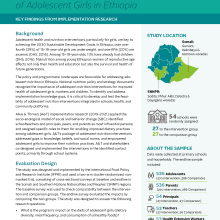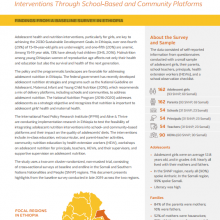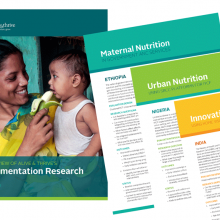Journal article
Jan 26 2024

First foods in a packaged world: Results from the COMMIT consortium to protect young child diets in Southeast Asia (Blankenship JL, White JM, et al. Maternal & Child Nutrition. 2023)
Forty-four percent of all foods and 72% of snacks commercially marketed for young children in Southeast Asia contained added sugars, a study by the Consortium for Improving Complementary Foods in Southeast Asia (COMMIT) initiative found.
Brief
Apr 06 2023

Improving Dietary Practices of Adolescent Girls in Ethiopia: Key findings from implementation research
From 2019 to 2021, Alive & Thrive supported the Government of Ethiopia to develop and implement an adolescent nutrition program to improve dietary practices among adolescent girls. This brief summarizes some of the notable highlights from the implementation research endline findings.
Journal article
Jun 16 2022

Determinants of Adolescent Nutrition Status and Practices in Burkina Faso Using a Pooled Secondary Analysis (Godha D, Likhite N, 2022, Cur Dev Nutrition)
This study showed a strong association between high dietary diversity and unhealthy food intake namely added sugar consumption among adolescents in Burkina Faso, an important consideration for policy makers as they design adolescent nutrition programs to reduce malnutrition.
Brief
Feb 09 2021

Adolescent Nutrition Interventions Through School-Based and Community Platforms
This brief presents findings on adolescent nutrition from a baseline study in Ethiopia.
Brief, Handout
Oct 28 2020

An overview of Alive & Thrive's implementation research
Alive & Thrive's implementation research spans its program areas, seeking to answer "how" to implement effective interventions and policies. Active studies are detailed in the attached documents.
Journal article
May 01 2018

Dietary diversity predicts the adequacy of micronutrient intake in pregnant adolescent girls and women in Bangladesh, but use of the 5-group cutoff poorly identifies individuals with inadequate intake (Nguyen PH., 2018. Journal of Nutrition)
The Minimum Dietary Diversity for Women (MDD-W) indicator based on a 10-food group women dietary diversity score (WDDS-10) has been validated to assess dietary quality in nonpregnant women.

